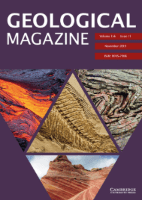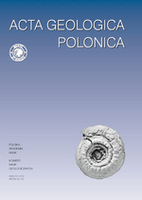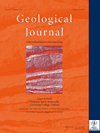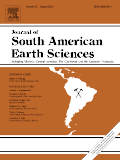
JOURNAL OF IBERIAN GEOLOGY
Scope & Guideline
Advancing geological knowledge of the Iberian Peninsula.
Introduction
Aims and Scopes
- Paleobiology and Paleontology:
Focus on the study of ancient life through fossils, including detailed descriptions of new species and insights into evolutionary processes, particularly in relation to the Iberian context. - Stratigraphy and Biostratigraphy:
Research emphasizing the layers of rock and sediment in the geological record, including biostratigraphic correlations that help in understanding the temporal and spatial distribution of organisms. - Tectonics and Structural Geology:
Investigations of the Earth's crustal deformation, including the analysis of tectonic settings, fault systems, and the geological history of regions affected by tectonic processes. - Geochemistry and Petrology:
Studies focusing on the chemical composition of rocks and minerals, understanding their origins, and the processes that lead to their formation, particularly in relation to mineral resources. - Sedimentology and Depositional Environments:
Examination of sedimentary processes and environments, including the mechanisms of sediment transport, deposition, and the resulting geological features.
Trending and Emerging
- Climate Change Impacts:
There is a growing emphasis on the geological records related to climate change, including studies that explore past climate conditions and their implications for current and future environmental challenges. - Hydrothermal and Geothermal Studies:
Research on hydrothermal systems and geothermal energy is on the rise, reflecting increased interest in sustainable energy sources and the geological processes that support them. - Paleoecology and Biodiversity:
Studies focusing on ancient ecosystems and biodiversity patterns are gaining traction, emphasizing the importance of understanding past life forms and their interactions with the environment. - Geological Hazards and Risk Assessment:
There is an emerging trend in research related to geological hazards, including seismic risk assessments and the implications of geological processes for human safety and infrastructure. - Innovative Geochemical Techniques:
The application of advanced geochemical methods, including isotopic analyses and trace element studies, is becoming more prominent, providing new insights into geological processes and material origins.
Declining or Waning
- Quaternary Studies:
Research related to the Quaternary period has become less prominent, possibly due to a shift towards more ancient geological periods or a focus on specific environmental aspects rather than broad Quaternary themes. - Geophysical Studies:
While geophysical methods are essential for understanding subsurface structures, there has been a noticeable decrease in publications focusing on geophysical surveys and interpretations in recent years. - Volcanology:
Despite the importance of volcanic studies, there appears to be a waning interest or fewer submissions related to volcanic activity, particularly those that do not directly relate to current geological events or hazards. - Paleoclimatology:
Research into ancient climate conditions has seen a reduction, which may reflect a broader trend towards more specific geological studies rather than overarching climatic themes. - Mineral Exploration:
The focus on mineral exploration, especially concerning new discoveries, has decreased, potentially due to market fluctuations and a shift in research priorities towards environmental impacts and sustainability.
Similar Journals

STRATIGRAPHY AND GEOLOGICAL CORRELATION
Unveiling the Secrets Beneath Our FeetSTRATIGRAPHY AND GEOLOGICAL CORRELATION is a prominent scholarly journal published by PLEIADES PUBLISHING INC, featuring a dedicated focus on the fields of geology, stratigraphy, and paleontology. With ISSN 0869-5938 and E-ISSN 1555-6263, this journal has been disseminating significant research findings since its inception in 1994, continuously contributing to the academic discourse through 2024. Despite not currently offering open access, its relevance is underscored by its Category Quartiles for 2023, where it has established itself as Q3 in Geology and Paleontology, and Q2 in Stratigraphy. STRATIGRAPHY AND GEOLOGICAL CORRELATION ranks #29 out of 55 in Stratigraphy and #186 out of 321 in Geology according to Scopus metrics, positioning it within the competitive landscape of Earth and Planetary Sciences. Researchers, professionals, and students are invited to engage with the journal’s content to deepen their understanding and foster innovation within these critical areas of study.

GEOLOGICAL MAGAZINE
Unveiling Earth's Secrets Through Rigorous ResearchGEOLOGICAL MAGAZINE, published by Cambridge University Press, is a premier journal in the field of geology, renowned for its rich legacy since 1864 and ongoing contributions to Earth and Planetary Sciences. With an impressive Q1 ranking in Geology and a Scopus rank of #70 out of 321 journals, it holds a significant position within the academic community, appealing to researchers, professionals, and students alike. The journal covers a wide array of topics, ensuring a comprehensive platform for the dissemination of cutting-edge geological research. Although it does not offer open access, it remains a vital resource for those seeking to stay abreast of advancements in the field. With an enduring commitment to quality, GEOLOGICAL MAGAZINE stands as an essential outlet for scholarly communication and serves as a catalyst for academic discourse within the geological sciences.

GEOLOGIA CROATICA
Bridging Gaps in Geological Research and EducationGEOLOGIA CROATICA is a distinguished open-access journal published by the Croatian Geological Survey, dedicated to advancing the field of Earth and planetary sciences. Since its inception in 1992, this peer-reviewed journal has become an essential resource for researchers, professionals, and students interested in various aspects of geology. With its robust impact factor and a prestigious place in Scopus rankings, ranking 127th out of 321 in Geology and 77th out of 159 in miscellaneous Earth and Planetary Sciences as of 2023, GEOLOGIA CROATICA maintains a strong international presence. It provides a platform for the dissemination of critical research findings, promoting collaboration and knowledge sharing among the global scientific community. By focusing on high-quality manuscripts that cover geological processes, hazards, and resources, this journal is pivotal for anyone looking to contribute to or expand their understanding of geological sciences. The journal's commitment to open access ensures that invaluable research is accessible to all, fostering a more informed and scientifically engaged society.

ACTA GEOLOGICA POLONICA
Unveiling Earth's secrets through rigorous scientific inquiry.ACTA GEOLOGICA POLONICA is a distinguished journal published by the Polska Akademia Nauk, in collaboration with the University of Warsaw's Geology Department. Since its inception, it has served as a vital platform for disseminating innovative research in the field of Geology, reflecting a commitment to advancing scientific knowledge in Earth and planetary sciences. With an ISSN of 0001-5709 and an E-ISSN of 2300-1887, this journal provides a rigorous review process and is classified in the Q3 quartile for Geology as of 2023, indicating its growing influence in the discipline. Despite not being open access, the journal facilitates meaningful contributions that span a range of geological topics from fundamental research to applied sciences, thereby enriching the academic landscape. Researchers, professionals, and students alike are encouraged to engage with the valuable findings and discussions contained within its pages, which continue to shape the future of geological inquiry.

INTERNATIONAL JOURNAL OF EARTH SCIENCES
Connecting Global Insights in Earth SciencesINTERNATIONAL JOURNAL OF EARTH SCIENCES, published by Springer, is a leading journal in the field of Earth and Planetary Sciences, distinguished by its Q1 quartile ranking in the 2023 category of Earth and Planetary Sciences (miscellaneous). With an ISSN of 1437-3254 and an E-ISSN of 1437-3262, this journal has been a pivotal platform for researchers, academics, and practitioners since its inception in 1996. The journal's focus encompasses a broad range of topics within Earth sciences, making it a vital resource for contributions that enhance our understanding of geological processes, climate change, and planetary dynamics. The impact factor reflects its high standards and the significance of the research it publishes, ranking it in the 74th percentile among its peers as per Scopus. Furthermore, the journal offers Open Access options, facilitating the global dissemination of groundbreaking research. The editorial team is committed to advancing knowledge in Earth sciences, serving as an essential reference for students and professionals looking to engage deeply with this dynamic field.

GEOLOGICAL JOURNAL
Illuminating the path of geological research for over seven decades.GEOLOGICAL JOURNAL, an esteemed publication by WILEY, has been at the forefront of geological research since its inception in 1951. With an ISSN of 0072-1050 and E-ISSN of 1099-1034, this journal serves as a vital platform for disseminating high-quality, peer-reviewed research in the field of geology. Operating out of the United Kingdom, the journal proudly features a Scopus rank of 80 out of 321 in the Earth and Planetary Sciences category, reflecting its commitment to scholarly excellence, with a 2023 category quartile ranking of Q2. As part of its innovative approach, GEOLOGICAL JOURNAL seeks to foster interdisciplinary collaborations, advancing our understanding of earth processes, materials, and history. Although it does not offer open access options, its robust subscription model ensures that both professionals and students have access to groundbreaking insights. With a publication history that spans over seven decades, the GEOLOGICAL JOURNAL continues to be an indispensable resource for the global geological community, encouraging discoveries that shape our comprehension of the planet.

JOURNAL OF THE GEOLOGICAL SOCIETY OF INDIA
Fostering scholarly dialogue in Earth and Planetary Sciences.JOURNAL OF THE GEOLOGICAL SOCIETY OF INDIA, published by Springer India, serves as a pivotal platform for researchers and practitioners in the field of geology. Established in 1979, this journal has been instrumental in advancing geological research throughout India, showcasing both regional studies and cutting-edge global research. With its Category Quartile ranking of Q3 in the geology category for 2023, and a significant Scopus rank of 171 among 321 journals in Earth and Planetary Sciences, it remains a respected source of scholarly activity. The journal is dedicated to the dissemination of original research articles, reviews, and case studies that encapsulate the dynamic scope of geological science, thus contributing to the understanding of geological phenomena. Although currently not offering open access, the journal maintains a commitment to high-quality scholarship and aims to engage a diverse readership, enhancing the knowledge and practice of geology across various disciplines.

Andean Geology
Uncovering the Secrets Beneath the AndesAndean Geology is a prominent open-access journal, published by the SERVICIO NACIONAL GEOLOGIA MINERVA in Chile, dedicated to advancing the fields of geology, geochemistry, petrology, paleontology, and stratigraphy. Since its inception in 2009, the journal has provided a vital platform for the dissemination of research pertaining to the Andean region and beyond, featuring high-quality articles that contribute to our understanding of earth sciences. With an impressive ranking in the Q2 and Q3 quartiles across multiple categories, it reflects a growing impact in the geological community, evidenced by its status within Scopus rankings. Andean Geology not only supports the academic pursuit of knowledge with its open-access policy but also aims to foster collaboration among researchers and professionals worldwide, ensuring wide accessibility of groundbreaking research and promoting academic engagement. By covering a diverse array of topics relevant to the dynamic field of geology, this journal serves as an essential resource for students, professionals, and scholars dedicated to earth and planetary sciences.

Moscow University Geology Bulletin
Connecting Scholars in the Quest for Geological TruthsMoscow University Geology Bulletin, published by SPRINGER INT PUBL AG, is a prominent platform for disseminating critical research in the field of Earth and Planetary Sciences. With an ISSN of 0145-8752 and an E-ISSN of 1934-8436, this journal is well-regarded for its contributions to diverse geological studies and interdisciplinary advancements that shape our understanding of the planet. The journal has established itself in the academic community, particularly noted for its ranking in the Q3 category within Earth and Planetary Sciences as of 2023. Despite its limited open-access options, the Moscow University Geology Bulletin remains an essential resource for researchers, professionals, and students through its well-curated articles and synthesis of geoscientific knowledge. With annual volumes converging from various years, including significant years like 2012 to 2024, it aims to uphold its mission of fostering scholarly dialogue and innovation in the geosciences.

JOURNAL OF SOUTH AMERICAN EARTH SCIENCES
Unlocking the Mysteries of South America's Geological HeritageJOURNAL OF SOUTH AMERICAN EARTH SCIENCES is a premier interdisciplinary journal dedicated to publishing high-quality research in the fields of Earth-Surface Processes, Geology, and Paleontology, making it an essential resource for scientists and researchers focused on South American geology and its diverse geological phenomena. Published by Pergamon-Elsevier Science Ltd in the United Kingdom, this journal has been instrumental in disseminating groundbreaking studies since 1988, showcasing contributions that push the boundaries of knowledge in Earth and Planetary Sciences. With an impressive Scopus ranking—positioning it in the 74th percentile for Paleontology and 71st for Geology—this journal not only reflects robust academic quality but also its commitment to addressing critical geological challenges in South America. Researchers will appreciate its objective of advancing understanding of geological processes while providing insights into past, present, and future Earth environments. Although available through traditional subscription models, the journal's vast repository of articles enriches the academic landscape, facilitating the sharing of vital research among professionals, students, and geological practitioners.